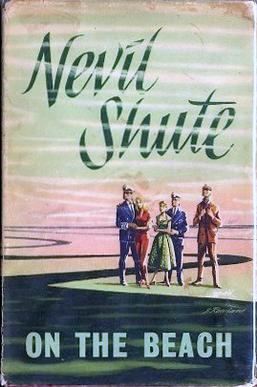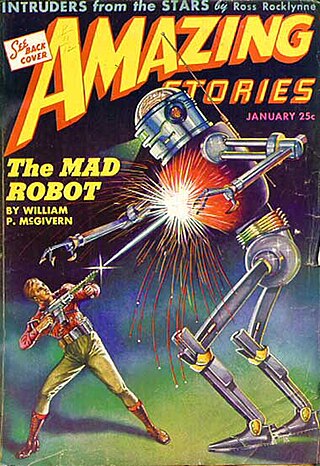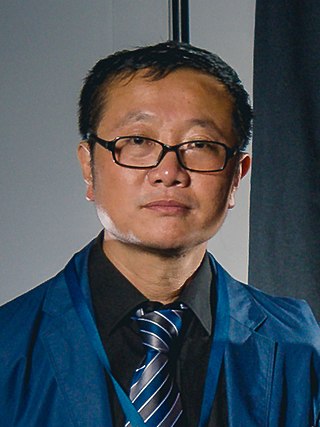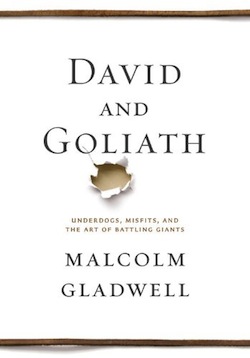
On the Beach is an apocalyptic novel published in 1957, written by British author Nevil Shute after he emigrated to Australia. The novel details the experiences of a mixed group of people in Melbourne as they await the arrival of deadly radiation spreading towards them from the Northern Hemisphere, following a nuclear war some years previous. As the radiation approaches, each person deals with impending death differently.

Strange and exotic weapons are a recurring feature in science fiction. In some cases, weapons first introduced in science fiction have been made a reality; other science-fiction weapons remain purely fictional, and are often beyond the realms of known physical possibility.

Lost in a Good Book is an alternate history fantasy novel by Jasper Fforde. It won the Independent Mystery Booksellers Association 2004 Dilys Award. It is the second in the Thursday Next series.

The submarine film is a subgenre of war film in which most of the plot revolves around a submarine below the ocean's surface. Films of this subgenre typically focus on a small but determined crew of submariners battling against enemy submarines or submarine-hunter ships, or against other problems ranging from disputes amongst the crew, threats of mutiny, life-threatening mechanical breakdowns, or the daily difficulties of living on a submarine.

Perdido Street Station is a novel by British writer China Miéville, published in 2000 by Macmillan. Often described as weird fiction, it is set in a world where both magic and steampunk technology exist. It won the Arthur C. Clarke Award and was ranked by Locus as the 6th all-time best fantasy novel published in the 20th century.

Terrance William Dicks was an English author and television screenwriter, script editor and producer. In television, he had a long association with the BBC science-fiction series Doctor Who, working as a writer and also serving as the programme's script editor from 1968 to 1974. The Doctor Who News Page described him as "arguably the most prolific contributor to Doctor Who". He later became a script editor and producer of classic serials for the BBC.

Lucky Starr and the Oceans of Venus is the third novel in the Lucky Starr series, six juvenile science fiction novels by Isaac Asimov that originally appeared under the pseudonym Paul French. The novel was first published by Doubleday & Company in 1954. Since 1972, reprints have included a foreword by Asimov explaining that advancing knowledge of conditions on Venus have rendered the novel's descriptions of that world inaccurate.
The Thursday Next series by Jasper Fforde currently consists of the novels The Eyre Affair, Lost in a Good Book, The Well of Lost Plots, Something Rotten, First Among Sequels, One of Our Thursdays Is Missing and The Woman Who Died a Lot.

Samson & Goliath, also known as Young Samson, is an American animated television series produced by Hanna-Barbera Productions for NBC, where it debuted on September 9, 1967. Primarily sponsored by General Mills, who controlled the distribution rights through its agency Dancer Fitzgerald Sample, Samson & Goliath was retitled Young Samson in April 1968 to avoid confusion with the stop-motion Christian television series Davey and Goliath.

The Hammer of God is a science fiction novel by Arthur C. Clarke originally published in 1993. Set in the year 2109, it deals with the discovery of an asteroid to be on course to collide with Earth and depicts the mission for deflecting the asteroid by using fusion thermal rockets.

Facing the Flag or For the Flag is an 1896 patriotic novel by Jules Verne. The book is part of the Voyages extraordinaires series.

Voyage to the Bottom of the Sea is a 1964–1968 American science fiction television series based on the 1961 film of the same name. Both were created by Irwin Allen, which enabled the film's sets, costumes, props, special effects models, and sometimes footage, to be used in the production of the television series. Voyage to the Bottom of the Sea was the first of Irwin Allen's four science fiction television series, and the longest-running. The show's theme was underwater adventure.
Goliath transmitter was a very low frequency (VLF) transmitter for communicating with submarines, built by Nazi Germany's Kriegsmarine navy near Kalbe an der Milde in Saxony-Anhalt, Germany, which was in service from 1943 to 1945. It was capable of transmission power of between 100 and 1000 kW and was the most powerful transmitter of its time.
Chinese science fiction is genre of literature that concerns itself with hypothetical future social and technological developments in the Sinosphere.

Liu Cixin is a Chinese computer engineer and science fiction writer. He is a nine-time winner of China's Galaxy Award and has also received the 2015 Hugo Award for his novel The Three-Body Problem as well as the 2017 Locus Award for Death's End. He is also a winner of the Chinese Nebula Award. In English translations of his works, his name is given as Cixin Liu. He is a member of China Science Writers Association and the vice president of Shanxi Writers Association. He is sometimes called "Da Liu" by his fellow science fiction writers in China.

David and Goliath: Underdogs, Misfits, and the Art of Battling Giants is a non-fiction book written by Malcolm Gladwell and published by Little, Brown and Company on October 1, 2013. The book focuses on the probability of improbable events occurring in situations where one outcome is greatly favored over the other. The book contains many different stories of these underdogs who wind up beating the odds, the most famous being the story of David and Goliath. Despite generally negative reviews, the book was a bestseller, rising to #4 on The New York Times Hardcover Non-fiction chart, and #5 on USA Today's Best-Selling Books.
Biological warfare (BW)—also known as bacteriological warfare, or germ warfare—has had a presence in popular culture for over 100 years. Public interest in it became intense during the Cold War, especially the 1960s and '70s, and continues unabated. This article comprises a list of popular culture works referencing BW or bioterrorism, but not those pertaining to natural, or unintentional, epidemics.
The Submarine Telegraph Company was a British company which laid and operated submarine telegraph cables.












